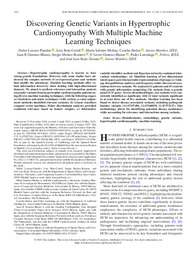Título :
Discovering Genetic Variants in Hypertrophic Cardiomyopathy With Multiple Machine Learning Techniques |
Autor :
Lozano-Paredes, Dafne 
Bote-Curiel, Luis 
Sabater-Molina, Maria 
Bielza, Concha 
Gimeno Blanes, Juan Ramón
Muñoz-Romero, Sergio 
Gimeno Blanes, Francisco Javier
Larrañaga, Pedro 
Rojo-Álvarez, José Luis  |
Editor :
IEEE |
Departamento:
Departamentos de la UMH::Ingeniería de Comunicaciones |
Fecha de publicación:
2025 |
URI :
https://hdl.handle.net/11000/37192 |
Resumen :
Hypertrophic cardiomyopathy is known to have strong genetic foundations. However, only some studies have addressed the complex network of co-expressed genes and variants that modify the phenotype. Machine learning methods offer robust information discovery when dealing with high-dimensional datasets. We aimed to perform relevance and interaction analysis on genetic variants from hypertrophic cardiomyopathy patients using diverse machine learning techniques, with the following stages: (a) Statistical univariate techniques (with various p-value adjustment methods) identified relevant variants; (b) Linear classifiers (support vector machines, Fisher discriminant analysis) provided combined relevance based on feature weights; (c) Informative variable identifier method and Bayesian networks explained inter-variant relationships; (d) Manifold learning of low-dimensional latent spaces gave interpretable representations of groups; (e) Linkage disequilibrium matrices and frequency tables discovered associations between variants. We analyzed 61 patients and 67 controls with genetic information comprising 216 variants from a genetic panel of 15 genes. Across all methodologies, ten variants were consistently identified as significant, with 22 total variants significant in at least three out of five methods. Machine learning has been found to detect disease-associated variants, including pathogenic founder variants (11:47357494, 11:47360070, 11:47372137). This methodology allows for identifying potential disease modulators while accounting for relevance and interactions among variants.
|
Palabras clave/Materias:
Bioinformatics
Embeddings
Genetic variants
Hypertrophic cardiomyopathy
Machine learning |
Área de conocimiento :
CDU: Ciencias aplicadas: Ingeniería. Tecnología |
Tipo de documento :
info:eu-repo/semantics/article |
Derechos de acceso:
info:eu-repo/semantics/openAccess
Attribution-NonCommercial-NoDerivatives 4.0 Internacional |
DOI :
https://doi.org/10.1109/TCBBIO.2025.3572833 |
Publicado en:
IEEE Transactions on Computational Biology and Bioinformatics |
Aparece en las colecciones:
Artículos Ingeniería Comunicaciones
|

 La licencia se describe como: Atribución-NonComercial-NoDerivada 4.0 Internacional.
La licencia se describe como: Atribución-NonComercial-NoDerivada 4.0 Internacional.
.png)